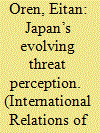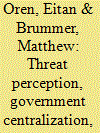| Srl | Item |
| 1 |
ID:
174857


|
|
|
|
|
| Summary/Abstract |
Scholars have recently commented on Japan’s increasing threat perception, either in the context of an ‘increasingly complex security environment’, or in the context of its use by Japanese elites to advance their political goals. Yet, while references to Japan’s threat perception are ubiquitous, conceptual clarity and comprehensive empirical evidence are far less so. This article seeks to address these gaps by conducting a longitudinal study of threat perception in postwar Japan. Data are driven from content analysis of debates in Japan’s national parliament over a period of seven decades (1946–2017). The evolution of Japan’s threat perception is analyzed, and a revisionist account of Japan’s threat perception is put forward. Thus, this study serves both as a metric of threat perception in postwar Japan and as a model for the study of threat perception in international relations.
|
|
|
|
|
|
|
|
|
|
|
|
|
|
|
|
| 2 |
ID:
175664


|
|
|
|
|
| Summary/Abstract |
In this paper, we review the International Relations literature and derive from it certain expectations of how government centralization may affect threat assessment, and from these, generate formal hypotheses. We then test these against the evidence of the extensive structural changes within Japan’s national security apparatus and the government’s threat perception in the period spanning the first and second Abe administrations (2006–2018). Drawing from official government documents, we find marked change to certain metrics of Japan’s threat assessment beginning in 2013, the first full year of the second (and current) Abe Administration. We argue that political instrumentality, and in particular, Abe’s policy agenda of breaking the constitutional status quo and resolving the territorial dispute with Russia, were paramount in shaping official threat assessment during this period (2012–2018). Our findings lend evidence to both the scholarships on threat perception and government centralization, as well as to the debate of Abe’s legacy in Japan’s post-war security policy.
|
|
|
|
|
|
|
|
|
|
|
|
|
|
|
|